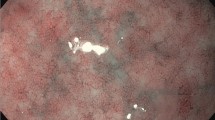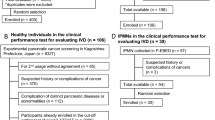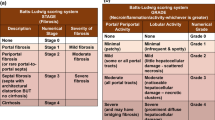Abstract
Background
Although serum p53 autoantibodies (s-p53-Abs) are induced even in the early stages of colorectal cancer, their positive rate is only approximately 20%. Therefore, we assessed the possibility of using other serum autoantibodies to increase the positive rates for detecting colorectal cancer.
Methods
Autoantibodies against 17 tumor antigens (p53, RalA, HSP70, Galectin1, KM-HN-1, NY-ESO-1, p90, Sui1, HSP40, CyclinB1, HCC-22-5, c-myc, PrxVI, VEGF, HCA25a, p62, and Annexin II) were evaluated in 279 patients with colorectal cancer and 74 healthy controls. Cutoff values were fixed at mean + 3 standard deviations of serum titers in healthy controls.
Results
Autoantibodies with the highest positive rates were p53 (20%), RalA (14%), HSP70 (12%), and Galectin1 (11%). Combination assays using multiple autoantibodies increased the positive rates based on the number of autoantibodies used. Positive rates of 56, 62, 66, 71, and 73% were obtained with 6, 9, 11, 14, and 17 antibodies, respectively, for the overall disease. Moreover, these autoantibodies showed relatively high positive rates even during stage 0/I disease (55 and 70% with 6 and 17 antibodies, respectively).
Conclusion
The measurement of set of 17 autoantibodies allowed autoantibody profiling in patients with colorectal cancer. The combination assay of six tumor antigens (p53, RalA, HSP70, Galectin1, KM-HN-1, and NY-ESO-1) achieved a positive rate of 56%. Such high positive rates will be helpful for detecting colorectal cancer regardless of tumor stages.







Similar content being viewed by others
References
Das V, Kalita J, Pal M (2017) Predictive and prognostic biomarkers in colorectal cancer: a systematic review of recent advances and challenges. Biomed Pharmacother. 87:8–19
Suzuki T, Shimada H, Ushigome M et al (2016) Three-year monitoring of serum p53 antibody during chemotherapy and surgery for stage IV rectal cancer. Clin J Gastroenterol 9(2):55–58
Hoshino I, Nagata M, Takiguchi N et al (2017) Panel of autoantibodies against multiple tumor-associated antigens for detecting gastric cancer. Cancer Sci 108:308–315
Ochiai H, Ohishi T, Osumi K et al (2012) Reevaluation of serum p53 antibody as a tumor marker in colorectal cancer patients. Surg Today 42:164–168
Yamaguchi T, Takii Y, Maruyama S (2014) Usefulness of serum p53 antibody measurement in colorectal cancer: an examination of 1384 primary colorectal cancer patients. Surg Today 44:1529–1535
Li Y, Karjalainen A, Koskinen H et al (2005) p53 autoantibodies predict subsequent development of cancer. Int J Cancer 114:157–160
Trivers GE, De Benedetti VM, Cawley HL et al (1996) Anti-p53 antibodies in sera from patients with chronic obstructive pulmonary disease can predate a diagnosis of cancer. Clin Cancer Res 2:1767–1775
Saito F, Shimada H, Ogata H et al (2017) Detection of the early phase of esophageal cancer progression into lamina propria mucosae by the serum p53 antibody. Esophagus 1:1–4
Xu YW, Peng YH, Chen B et al (2014) Autoantibodies as potential biomarkers for the early detection of esophageal squamous cell carcinoma. Am J Gastroenterol 109(1):36–45
Lin LH, Xu YW, Huang LS et al (2017) Serum proteomic-based analysis identifying autoantibodies against PRDX2 and PRDX3 as potential diagnostic biomarkers in nasopharyngeal carcinoma. Clin Proteomics 1(14):6
Chen H, Werner S, Butt J et al (2016) Prospective evaluation of 64 serum autoantibodies as biomarkers for early detection of colorectal cancer in a true screening setting. Oncotarget 29(7):16420–16432
Negm OH, Hamed MR, Schoen RE et al (2016) Human blood autoantibodies in the detection of colorectal cancer. PLoS One 11(7):e0156971
Okada R, Shimada H, Tagawa M et al (2017) Profiling of serum autoantibodies in Japanese patients with hepatocellular carcinoma. Toho J Med 3(3):84–92
Nanami T, Shimada H, Yajima S et al (2016) Clinical significance of serum autoantibodies against Ras-like GTPases RalA in patients with esophageal squamous cell carcinoma. Esophagus 13:167–172
Shiratori F, Shimada H, Nagata M et al (2016) Serum galectin-1 autoantibodies in patients with hepatocellular carcinoma. Toho J Med 2:67–72
Oshima Y, Shimada H, Yajima S et al (2016) NY-ESO-1 autoantibody as a tumor-specific biomarker for esophageal cancer: screening in 1969 patients with various cancers. J Gastroenterol 51:30–34
Edge SB, Byrd DR, Compton CC et al (2010) AJCC cancer staging manual, 7th edn. Springer, New York
Zhang JY, Casiano CA, Peng XX et al (2003) Enhancement of antibody detection in cancer using panel of recombinant tumor-associated antigens. Cancer Epidemiol Biomarkers Prev 12:136–143
Boyle P, Chapman CJ, Holdenrieder S et al (2011) Clinical validation of an autoantibody test for lung cancer. Ann Oncol 22:383–389
Kanda Y (2013) Investigation of the freely available easy-to-use software ‘EZR’for medical statistics. Bone Marrow Transplant 48:452–458
Shimada H, Hoshino T, Okazumi S et al (2002) Expression of angiogenic factors predicts response to chemoradiotherapy and prognosis of esophageal squamous cell carcinoma. Br J Cancer 86:552–557
Tokunaga R, Sakamoto Y, Nakagawa et al (2017) The utility of tumor marker combination, including serum P53 antibody, in colorectal cancer treatment. Surg Today 47:636–642
Shimada H, Shiratori T, Takeda A et al (2009) Perioperative changes of serum p53 antibody titer is a predictor for survival in patients with esophageal squamous cell carcinoma. World J Surg 33:272–277
Acknowledgements
Junichi Koike received research grant from JSPS KAKENHI Grant Number JP26462029.
Author information
Authors and Affiliations
Corresponding author
Ethics declarations
Conflict of interest
Hideaki Shimada received research Grants from Medical & Biological Laboratories Co., Ltd., Nagoya, Japan. Akiko Kuwajima is an employee of the Medical & Biological Laboratories Co., Ltd., Nagoya, Japan. The other authors declare that there are no conflicts of interest associated with the present study.
Informed consent
Informed consent was obtained from all patients, and the study was approved by the Ethics Committee of Chiba Cancer Center (no. 21-26) and Toho University School of Medicine (nos. 22-112 and 22-047). This clinical study has been registered in the UMIN Clinical Trials Registry (UMIN000014530).
About this article
Cite this article
Ushigome, M., Nabeya, Y., Soda, H. et al. Multi-panel assay of serum autoantibodies in colorectal cancer. Int J Clin Oncol 23, 917–923 (2018). https://doi.org/10.1007/s10147-018-1278-3
Received:
Accepted:
Published:
Issue Date:
DOI: https://doi.org/10.1007/s10147-018-1278-3




